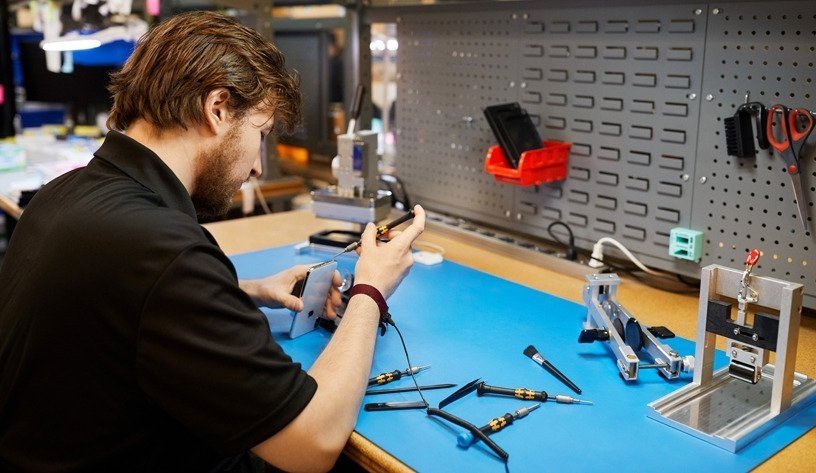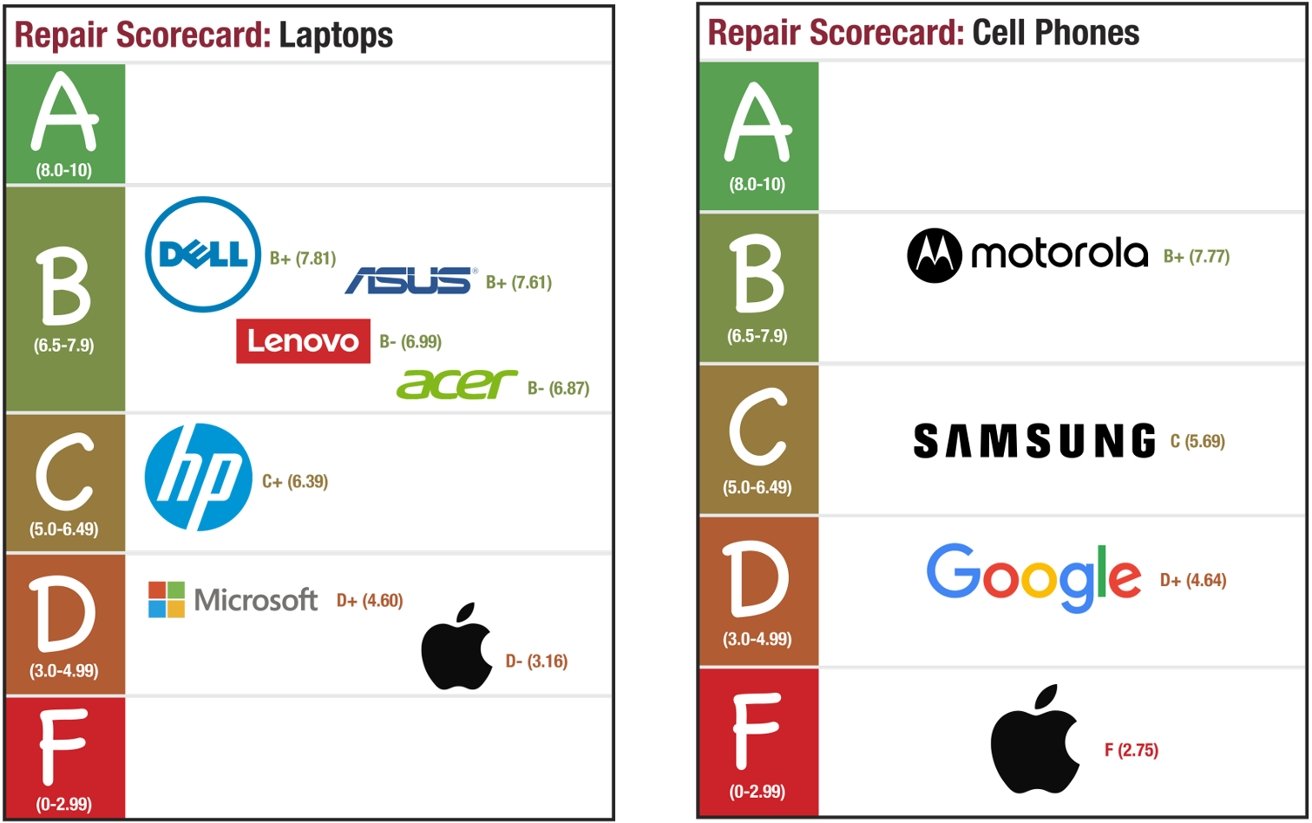Apple given an 'F' by US consumer advocacy group over difficult iPhone repairs
Apple's iPhone and MacBooks are some of the most repair-unfriendly devices on the market, a U.S. PIRG report claims, with it scoring the lowest marks of major producers on the organization's repair scorecards.

Over the years, Apple's hardware has become much harder to repair, and has been the target of right-to-repair campaigns over its hardware. In a new report from the U.S. Public Research Interest Group, the iPhone maker is dead last in groups of major smartphone and notebook producers, in terms of repairability.
The report combines data from multiple sources to produce its grades, including self-reported scores mandated by the French government. With assistance from iFixit, the manufacturer-derived data is combined with how easy it is to acquire spare parts or documentation, and how the manufacturers respond to right-to-repair legislation attempts.
"Because repairing products is dependent on your ability to get access to necessary repair materials, our grade also reflects companies' record of lobbying against Right to Repair, or membership in associations which are prominent Right to Repair opponents," writes the U.S. PIRG.

Repair Scorecards by US PIRG
For smartphones, Apple scored the lowest possible grade of F and a total of 2.75. Its French score was 5.64, with an average disassembly rating of 2.86 out of 10.
The report says that Apple lost the most points due to their engagement in opposing repair-friendly legislation.
Of the remainder, Google was third with a D+ and a score of 4.64, while Samsung was second with a C at 5.69. Motorola topped the list with a B+ and a 7.77 score.
On the notebook repair scorecard, Apple achieved a D- result with a score of 3.16. The result combined its average French score of 6.08 out of 10 with an average disassembly rating of 3.25 out of 10.
Apple was also penalized for its active lobbying against right to repair and supporting trade groups that were against the measures.
By comparison, Microsoft scored a D+ with 4.6, HP got a C+ with 6.39. Dell led the group with a B+ (7.81) followed by Asus (B+, 7.61), Lenovo (B-, 6.99), and Acer (B-, 6.87.)
Though Apple has routinely made it hard for fixes to be performed by users and third-party repair shops, the company has taken steps to change how it deals with the subject.
In November, it announced a "Self Service Repair" program that would start to sell parts and tools directly to consumers sometime in early 2022. Starting with the iPhone 12 and iPhone 13, the program will also expand to the Mac with M1 chips.
The move was welcomed by iFixit, calling it a "remarkable concession" to consumers wanting to do their own repairs.
Read on AppleInsider

Over the years, Apple's hardware has become much harder to repair, and has been the target of right-to-repair campaigns over its hardware. In a new report from the U.S. Public Research Interest Group, the iPhone maker is dead last in groups of major smartphone and notebook producers, in terms of repairability.
The report combines data from multiple sources to produce its grades, including self-reported scores mandated by the French government. With assistance from iFixit, the manufacturer-derived data is combined with how easy it is to acquire spare parts or documentation, and how the manufacturers respond to right-to-repair legislation attempts.
"Because repairing products is dependent on your ability to get access to necessary repair materials, our grade also reflects companies' record of lobbying against Right to Repair, or membership in associations which are prominent Right to Repair opponents," writes the U.S. PIRG.

Repair Scorecards by US PIRG
For smartphones, Apple scored the lowest possible grade of F and a total of 2.75. Its French score was 5.64, with an average disassembly rating of 2.86 out of 10.
The report says that Apple lost the most points due to their engagement in opposing repair-friendly legislation.
Of the remainder, Google was third with a D+ and a score of 4.64, while Samsung was second with a C at 5.69. Motorola topped the list with a B+ and a 7.77 score.
On the notebook repair scorecard, Apple achieved a D- result with a score of 3.16. The result combined its average French score of 6.08 out of 10 with an average disassembly rating of 3.25 out of 10.
Apple was also penalized for its active lobbying against right to repair and supporting trade groups that were against the measures.
By comparison, Microsoft scored a D+ with 4.6, HP got a C+ with 6.39. Dell led the group with a B+ (7.81) followed by Asus (B+, 7.61), Lenovo (B-, 6.99), and Acer (B-, 6.87.)
Though Apple has routinely made it hard for fixes to be performed by users and third-party repair shops, the company has taken steps to change how it deals with the subject.
In November, it announced a "Self Service Repair" program that would start to sell parts and tools directly to consumers sometime in early 2022. Starting with the iPhone 12 and iPhone 13, the program will also expand to the Mac with M1 chips.
The move was welcomed by iFixit, calling it a "remarkable concession" to consumers wanting to do their own repairs.
Read on AppleInsider

Comments
At this point, repairability actually adds to the cost of manufacturing and impairs product quality. Designed-in repairability will impair compactness, dust and water proofing, and assembly costs. Not to mention security and privacy. So most of us will be penalized with more expensive less capable devices just to benefit what is basically a minuscule cottage industry of repair outfits.
I am not saying that electronic junk is not a serious environmental problem but a long term solution doesn't lie in repairability. Comprehensive, designed-in reduced material usage and recyclability is where the truly effective solution lies.
Or we can cancel the free market and issue orders to every company telling them what they can build.
Secondly, if you had read the report you can see that none of the big manufacturers, including Samsung have very good scores, and most manufacturers engage in massive amounts of lobbying via professional lobbyists, and using the legal system to attack independent repair providers and attempts to make repair easier. There ARE NO CHOICES. With the exception of 1 or 2 niche new manufacturers, manufacturers are anti-repair. Claiming that this is a free market economy which the manufacturers are engaging in is flat out misinformation.
Repairability requires very minor changes, such as part availability and documentation and just not gluing things together. Read the damn report.
Or what about this: you can keep using macs and iPhones and you also get to repair them instead of buying new ones if Apple actually sold parts and documentation to third party repair?
The examples the report gives are fairphone and the Framework laptop, and there have been of decently repairable, thin AND affordable devices within the last 10 years. And this is primarily about third part repair PROFESSIONALS, with sautering equipment and skills. And guess what? You can actually get your car repaired by independent repair because of rtr. Would you rather have that banned and be forced to pay 3x the price at the manufacturer? Yeah, probably not.
There are examples of repairable, sleek and reasonably low cost devices. In fact, this was the norm even with smart phones not too long ago. There have also been dust and water proofed repairable devices. (https://www.androidcentral.com/best-sustainable-repairable-phones)
You make a lot of claims without evidence, but your claim of lack of security and privacy is the most ridiculous. I fully admit that android phones don't have a good track record with data security due to software diversity, but if repairability and open source is a security risk, explain to me how graphene os running on a pixel or qubes running on a power9 board is unsecure. It's, of course, ridiculous considering those technologies were designed for openness yet are considered the pinnacle of security hardened technology. Security achieved by design, not by obscurity. It's a pretty universal principle in the infosec world.
Regarding the claim of repairing being a "cottage industry":
- Eight out of ten Americans (81%) say they have, in the past five years, replaced at least one of the types of items we asked about (smartphones, small and large home appliances, and vehicles) due to breakage.
- When deciding which product to purchase in certain categories, repairability is important. For those planning to buy a vehicle, 83% say repairability is very important; for large appliances, 60% say it’s very important.
The reason why independent repair is small right now is because it has been made difficult and manufacturer repair is overpriced in contrast to what independents charge or would charge. Manufacturers generally benefit from consumers not repairing their devices.Source: https://advocacy.consumerreports.org/press_release/consumer-reports-survey-finds-americans-overwhelmingly-support-the-right-to-repair/
Everyone here should actually read the report and also read the ftc report below.
https://www.ftc.gov/system/files/documents/reports/nixing-fix-ftc-report-congress-repair-restrictions/nixing_the_fix_report_final_5521_630pm-508_002.pdf
Stop simping for corporations. If you have apple devices you should be happy right to repair is going forward, since it gives you more options in the market and lowers your costs.
https://www.theverge.com/2021/11/17/22787336/apple-right-to-repair-self-service-diy-reason-microsoft